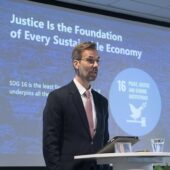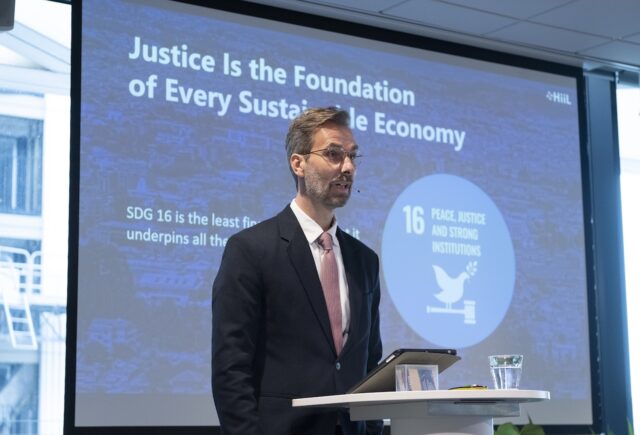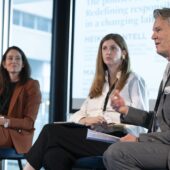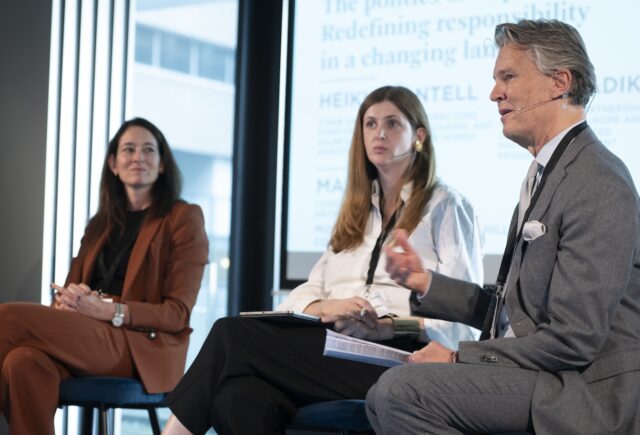Katherine Garrett-Cox, one of the women to make it to the top of fund management in the City of London, talks about pioneering sustainability in the Middle East and keeping the oceans blue.
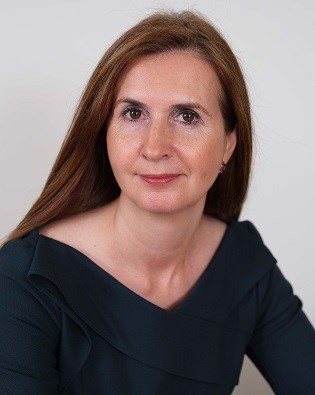
CV
- Chief Executive Officer, GIB Asset Management, 2017- present
- Chair, Clean Air Fund, 2019-present
- Chair, CDP Worldwide, 2017-present
- Chief Executive Officer, Alliance Trust PLC, 2007-2016
- Chief Investment Officer, Morley Fund Management (Aviva Investors), 2004-2007
- Chief Investment Officer, Aberdeen Asset Management, 2000-2004
- Head of American Equities, Hill Samuel Asset Management, 1983-2000
Katherine Garrett-Cox used to be nicknamed ‘Katherine the Great’ in the City of London, and surveying her achievements you can quickly see why. As Chief Investment Officer at Morley Fund Management she was a pioneer in sustainable and responsible investing.
She was one of the early signatories to PRI (the Principles for Responsible Investment). She also sat on the first Commission for setting up a Green Investment Bank in 2010 in the UK.
So, it might at first sight seem surprising she chose to become Chief Executive of the Gulf International Bank’s (GIB) asset management arm. With its obvious association with fossil fuels, the Gulf might not seem the first choice for an investment eco-warrior.

Trailblazing in the Middle East
Garrett-Cox admits “I have a history for making surprising choices.” She tells Impact Investor that at university she was always interested in Islamic history and the interconnections between the European and Middle Eastern world.
And, more importantly, Garrett-Cox feels that GIB offered her “an interesting chance to take an asset management franchise and give it purpose and a proposition.” She seeks to give GIB “a sustainability lens,” adding: “The foundations were there already; what I am looking to do is to scale capital in support of sustainable development.”
Garrett-Cox is especially interested in the potential for sustainable investment in the Gulf region. “The Middle East is a less crowded space. We are getting in early, being trailblazers. It is my belief that soon, nobody in the region will want to be left out.”
She is “intrigued about the lack of retail opportunities, even via wealth platforms, for impact investing.” That’s a gap she hopes GIB “will eventually fill.”
GIB Sustainable World Fund
To this end Garrett-Cox recently launched the GIB Sustainable World Fund and hired Neil Brown, an old colleague, to manage the new, actively managed long-only fund. It is holding 40-60 positions divided into two major multi-year themes. The first theme she defines simply as ‘people,’ the second as ‘planet.’
In the people bucket are real-world themes such as ‘safe mobility’, an ‘inclusive economy’, ‘nutrition and healthcare systems’. On this last point, Garrett-Cox is interested “in tackling obesity and diabetes,” while on mobility she says she’s very interested in road safety.
“This is a big issue with 1.4 million people dying annually on the roads every year, and road deaths being the leading cause of death in 5- to 29-year-olds globally.”
The fund will have a target return of 2% over the MSCI benchmark on a rolling five-year basis; the initial target market is institutions in the Middle East, with the intention to then broaden out to other investor channels across Europe.
Impact funds and ‘blue investing’
Looking to the future Garrett-Cox says that she has in mind the creation of a series of specialist impact funds. “These are still very much in the design phase, and we need to talk with clients to understand what they want within specific themes like water shortage or female empowerment, but our direction of travel is clear.”
Garrett-Cox says oceans are a particular passion of hers which probably dates back to her childhood love of sailing. She is one of the 65 elite individuals who form the World Economic Forum’s Friends of Ocean Action.
“I want to bring nature into investment decision-making and for investors to focus on the importance of biodiversity,” she says. She feels that “in order for more blue finance initiatives to be taken, investors need the right data points.”
“Without data and a better understanding of ocean science, there’s no common ground or understanding as to either the scale of the problem or how the opportunities presented within the blue finance sphere can be correctly identified and attract the required capital,” she notes.
Garrett-Cox was particularly inspired by a book called The Nature of Nature by Enric Sala, who she feels is a pioneer with his project ‘Pristine Seas.’ “Enric (Sala) is at the core of this issue and makes an impassioned plea for the oceans not least because they are a massive carbon sink,” she says.
“It is the responsibility of the asset management industry to design the appropriate products that will allow individuals and institutions to participate in the future of oceans. If we can come together with better product design, we will have what I call an ‘Arrowhead’ of progress.”
“What is the impact I have left?”
Garrett-Cox has a strong sense of personal mission. She is involved in many different charitable works, including as Chair of The Clean Air Fund which fights for air quality globally, and she says she is a particular fan of its founder Jane Burston.
Garrett-Cox is also Chair of CDP, the global reporting platform for environmental disclosure. In 2021 there were around 14,000 disclosing entities (companies, cities, states, and regions) on the platform, registering a growth of 35% over 2020.
“We have made a real difference,” says Garrett-Cox about CDP, adding that “close to two-thirds of the global market by capitalisation are now issuing environmental reports.” The number of companies disclosing their environmental data recently jumped to the highest in CDP’s 20-year history, which Garrett-Cox says is “a good indicator that people have woken up to the biggest emergency facing mankind.”
Data is a common thread. “Data sits at the heart of how we create a more effective ecosystem to scale and mobilise capital to create a more sustainable world. No data, no evidence, no urgency to act.”
In summing up her approach, Garrett-Cox says “Covid has taught us we don’t have lots of time on this planet, we have to move away from short-term issues. We should each ask ourselves “what difference have I made? What is the impact I have left?””
